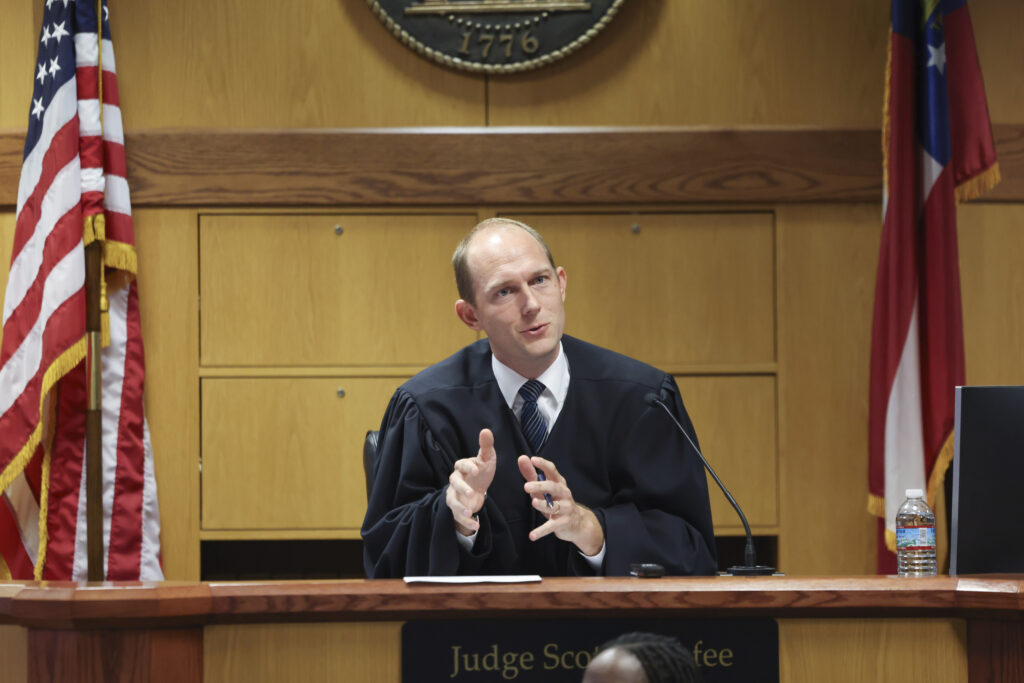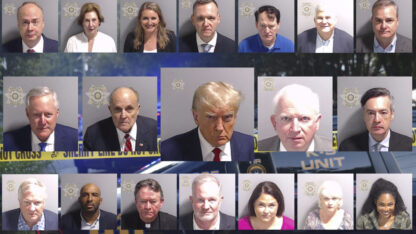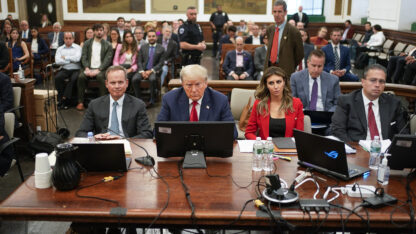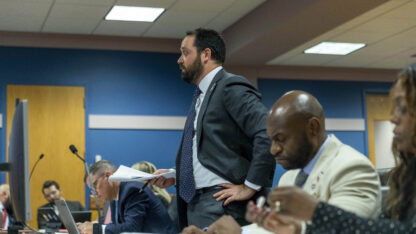Do eligible jurors exist in Fulton County who haven’t formed strong opinions about Donald Trump and his allies accused of trying to overturn his 2020 presidential election loss in Georgia?
We’ll soon find out. A jury selection process is scheduled to begin on Friday for the first trial in the Fulton County 2020 presidential election interference case when 450 prospective jurors are expected to complete a lengthy questionnaire about the high-profile case.
On Monday, Fulton County prosecutors and the defense attorneys for Sidney Powell and Kenneth Chesebro argued before Fulton County Superior Court Judge Scott McAfee about whether several questions gauging jurors’ opinions about prominent witnesses and Trump supporters should be included in the final cut of the jury questionnaire. On Friday, the first half of a jury pool of 900 has been summoned to the downtown Atlanta courthouse, ahead of Monday’s scheduled opening day of the trial for Chesebro and Powell.
The pair are set to be the first of the 19 defendants to stand trial in the sweeping racketeering case that alleges Trump and 18 allies illegally tried to overturn the 2020 presidential election in Georgia and several other states.
In Fulton County court Monday, Chesebro and Powell’s attorney argued against McAfee excluding questions about whether potential jurors believe that Trump and his associates attempted to steal their vote and whether they think that the typical Republican MAGA supporter is bigoted.
Scott Grubman, Chesebro’s attorney, said the unique circumstances of the conspiracy case being prosecuted under Georgia’s Racketeer Influenced and Corrupt Organizations Act warrant a judge exercising greater discretion.
“To ask them simply, ‘are you going to be fair and impartial?’, it goes completely against all of the social science that is out there,” Grubman said. “The only people who are going to say no to that question are people who want to be off this jury. Everyone else is going to convince themselves of course I can be fair and impartial.”
McAfee said he’s likely to exclude these types of questions from the questionnaire, but said that attorneys from both sides should be able to identify potential red flags later on during the selection process.
“I get completely what you’re talking about when you say this is how we figure out what these jurors actually think,” McAfee said. “Ultimately, what I’m applying is decades of case law that says we’re not supposed to ask jurors opinions up front.”
McAfee also said he would remove an open-ended question asking for jurors’ opinions of Powell and Chesebro. In addition, he plans to work on how to rephrase how to ask potential jurors about any biases they may have toward co-defendants and District Attorney Fani Willis.
The jury survey is also expected to inquire what types of statements that a prospective juror has posted on social media regarding Trump and his allies.
“Just because it’s struck from the questionnaire doesn’t mean it’s foreclosed from going into on in individual questioning,” McAfee said. “We’re asking overall if we think there is anything outright that shows bias or fixed opinion and I don’t think we need to keep asking that a dozen different ways on the questionnaire.”
On Monday, McAfee agreed to include the names of each defendant in the questionnaire background as part of a compromise to prosecutors’ objections to the defense proposing open-ended questions about jurors’ opinions of witnesses and defendants.
Powell’s attorney Bill Rafferty pushed for the initial query to reference notable witnesses for the trial, such as Republican Gov. Brian Kemp, conservative media personality Alex Jones, Trump’s chief strategist Steve Bannon and Michael Flynn, who served as Trump’s national security advisor.
He argued that would streamline jury selection for a monthslong case in which prosecutors plan to present the same evidence and more than 150 witnesses at each trial.
“If the government’s intention is to offer up a lot of information about President Trump, Rudy Giuliani and John Eastman that has nothing to do with my client, we’d ask the court to ask jurors about their opinions about these individuals,” Rafferty said.
Prosecutors contended that asking jurors how they feel about potential state witnesses is inappropriate since it’s asking them to decide ahead of trial which side they believe is more credible.
McAfee agreed with the Fulton County District Attorney’s Office not to seek jurors’ opinions about specific witnesses.
“Whether we can find a jury that’s fair and impartial is the ultimate question, so how they feel about a potential witness is unnecessary,” he said.
This story was provided by WABE content partner Georgia Recorder.










